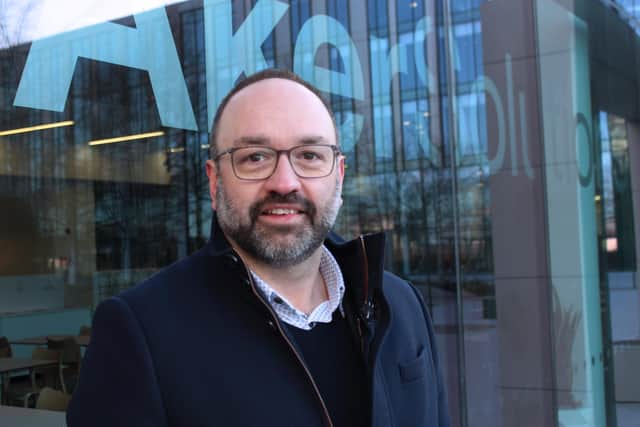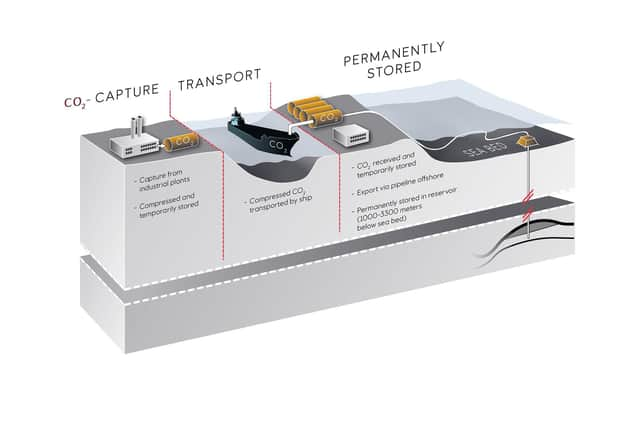Decarbonisation battle plan in Scotland faces many challenges - Jason Brown
Carbon capture, utilisation and storage (CCUS) will play a crucial role in tackling the myriad challenges ahead, including for those hard to abate sectors such as manufacturing and industrial power.
And beyond the direct impact on the hundreds of millions of tonnes of carbon dioxide that need to be stripped from our annual emissions over the coming decades, the sector is additionally proven, safe and reliable – with massive potential benefits in terms of employment, investment and export opportunities.
Advertisement
Hide AdAdvertisement
Hide AdCCUS already has many of the tools and skills required, although of course innovation is ongoing with an eye to increased efficiencies and reduced costs. Major power, construction and engineering companies, including Aker Solutions, are pioneering large-scale CCUS hubs and preparing to roll out the lessons learned.


Proven and ready
The basics of CCUS are straightforward and largely of the 'it does what it says on the tin' variety: capture CO2 where it is produced, transport it to where it can be stored, and put safely to work when needed – whether in materials, power or processes.
Industrial-scale carbon capture already boasts a more than 25-year track record, and Aker Solutions is proud to have been involved from the earliest stages. The landmark Sleipner CCS installation off Norway went live in 1996 as part of a natural gas development, and since that time roughly one million tonnes of CO2 per annum has been gathered, compressed and re-injected into subsea geological formations.
A number of similarly pioneering projects followed in Sleipner's footsteps, while next-generation installations are now taking shape off Norway, across a number of UK industrial net zero hubs, and in other locations around the world.


The proposed Net Zero Teesside in the northeast of England is illustrative of the central role that CCUS can play. The integrated project will include a combined cycle gas turbine producing 860MW, with carbon captured at source and transported via pipeline to geological store in the North Sea.
In addition, infrastructure will allow CO2 to be gathered from industrial emitters across the Humber and Teesside region potentially removing around 30 million tonnes per annum from the region's carbon footprint.
Non-stop hits
The potential of CCUS does not stop with large industrial clusters; in Scotland the Neccus alliance – an initiative aimed at reducing industrial emissions – has identified potential routes ahead for the country's 28 largest emitters and 100 individual sources.


Recent analysis carried out by Aker Solutions provided cost estimates and front-end engineering and design for CO2 capture, compression and pipeline transportation for each facility, paving the way to ensure they are fit for purpose in the net-zero economy.
Advertisement
Hide AdAdvertisement
Hide AdResults show how far the industry has come; reports were produced in half the usual time thanks to standardised methodology based on a combination of digital tools, software solutions and client data including CO2 volume and concentrations, and process conditions such as temperature and pressure.
The study provided the clarity necessary to inform future decarbonisation plans, outlining what is required, what is possible, the potential economic impacts and the full range of CCUS options involved – the first steps outlining a critical part of decarbonising Scotland's hard to abate sectors.
Overcoming hurdles
There are, however, a number of challenges to overcome. CCUS is a complex, cross-discipline technology that will require expertise in engineering, construction, power and transport. Factors such as flow assurance and material selection are particularly intricate so require experienced subject matter experts. This means partnerships and collaboration across companies and sectors will be crucial to maximising the benefits.
Equally important will be flexibility and adaptability. Aker Solutions, for example, is ready to help facilitate CCUS through a mix of expertise that includes project management, subsea technologies, brownfield renovation, pipeline infrastructure and major fabrication, to name but a few. And our consultancy business can provide early insights into specific CCUS opportunities.
Geography also represents a potential hurdle: inland areas without proximate access to pipeline infrastructure and offshore storage will need transport solutions, made more difficult in parts of the country with multiple but dispersed smaller-scale businesses – glass, bricks, ceramics, cement. Concepts such as 'CCS as a service' will have a role to play.
Other constraints include global supply chains, which are already tight and due to face increased pressure as other decarbonisation efforts – for instance offshore wind and the switch from coal to gas – gather speed. Human resources, finance and industrial capacity will all be stretched.
Carbon conquered
Carbon dioxide accounts for up to 80 per cent of the UK's greenhouse gas emissions and government has set targets to capture up to 30 million tonnes of CO2 per annum by 2030, with many times that total required to meet net zero in 2050.
Carbon capture is an established technology, has a proven – and safe – track record, and offers the potential to transform the industrial landscape of the country across both large-scale coastal emitters and smaller, dispersed inland clusters.
Advertisement
Hide AdAdvertisement
Hide AdTens of thousands of jobs can be created, protected and sustained, efficiencies can be accelerated with cost curves reduced, and global export opportunities can be secured through first-mover advantage – all while climate targets are achieved across some of the most carbon-stubborn segments of the economy.
Experience and expertise will of course be essential to the CCUS story, which is why Aker Solutions is committed to playing its part, and why we are calling for a focus on partnerships and collaboration as a foundation of the journey ahead.
The benefits will be shared by all of us.
Jason Brown, senior vice president and head of UK renewables with energy sector specialist Aker Solutions
Comments
Want to join the conversation? Please or to comment on this article.